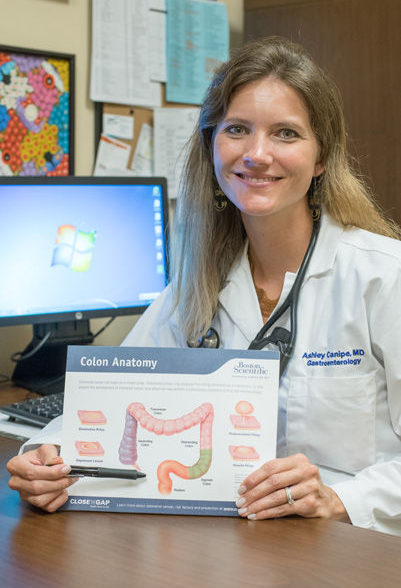
Ulcerative colitis (UC) is an uncomfortable condition for its 700,000 American sufferers; often having a significant impact on their quality of life. It’s a type of inflammatory bowel disorder in which the innermost lining of the large intestine becomes inflamed, causing a host of symptoms that can include abdominal pain, fever, weight loss and fatigue.
Dr. Ashley Canipe, an interventional gastroenterologist affiliated with Indian River Medical Center, says that drug treatment options depend on the stage and severity of the disease. Drug types include corticosteroids, immune modifiers, and biologics. Each type works differently, but in all cases the goal is to decrease the inflammation in the lining of the intestines. The medication is delivered by pill, injection, or by enema.
There now comes a study out of Brigham and Women’s Hospital (BWH) in Boston that will be of interest to UC sufferers who endure daily enemas. The researchers say that a lab-created water-based gel (a hydrogel) offers a potentially better way to deliver drugs via enema, which would allow for weekly –rather than daily – treatments.
The BMH team tested the hydrogel in two ways (the drug involved was a corticosteroid):
- They administered drugs via hydrogel to mice genetically engineered to have ulcerative colitis, and found that the hydrogel relieved inflammation more effectively than when given via traditional enemas.
- Using tissue samples from humans with ulcerative colitis, the researchers found that hydrogel showed a preference for sticking to inflamed regions rather than to healthy tissue.
One of the study’s authors is Jeff Karp, who heads a lab that develops advanced biomaterials and devices for therapeutic uses. He says, “We realized that if we could develop a disease-targeted hydrogel system that rapidly attaches to ulcers and slowly release drugs at the site of inflammation, then we could create a better way to deliver medicine only where the drug is needed.”
The research showed that mice that received the hydrogel-based therapy had much lower concentrations of the drugs in their bloodstreams – suggesting the hydrogel-based delivery results in less medication reaching the rest of the body. This means fewer side effects, as the corticosteroids won’t be absorbed by healthy tissue (as is the case with drugs delivered by a traditional enema).
Vero’s Dr. Canipe says a faulty immune response is the culprit in both UC and Crohn’s disease (another inflammatory bowel disorder, Crohn’s causes inflammation of the digestive tract lining). She says, “The exact mechanism is not well understood, but the body attacks itself. The drugs that are used to treat the disease alter the immune system to stop this attack.” Inflammatory bowel disease is more common in people who have family members with the disease – they share genes that make them susceptible to abnormal immune system responses.
There is little evidence that ulcerative colitis symptoms are triggered by any certain foods, but sufferers are advised to:
- Keep a diet diary to help pinpoint troublesome foods
- Adjust eating patterns as necessary
- Maintain a well-balanced diet
- Drink a lot of fluids
Most often, people are diagnosed with UC in their mid-30s, although it can develop at any age. Men are more likely than women to develop it later – in their 50s and 60s.
Dr. Canipe says that because of the nature of the medicines used to treat UC, people with the disease should be diligent about getting all their physician-recommended vaccines, and talk to their doctor about regular exams to screen for other conditions.
In very severe cases, ulcerative colitis is treated surgically, by removing the entire colon; this cures the disease. Dr. Canipe says, “There is a stigma associated with such an operation, but there shouldn’t be. Patients don’t necessarily end up having to use a colostomy bag. Often, continence can be maintained.” Removal of the colon also eliminates the risk of colorectal cancer; a risk that is increased in patients who have had UC for seven years or longer.
The BWH team, whose findings were published in Science Translational Medicine, now plans to replicate their tests with other drugs and run more preclinical tests before starting trials in humans.
Dr. Canipe’s office is located at 3745 11th Circle, Suite 101 in Vero Beach; the office phone is 772-299-3511.



